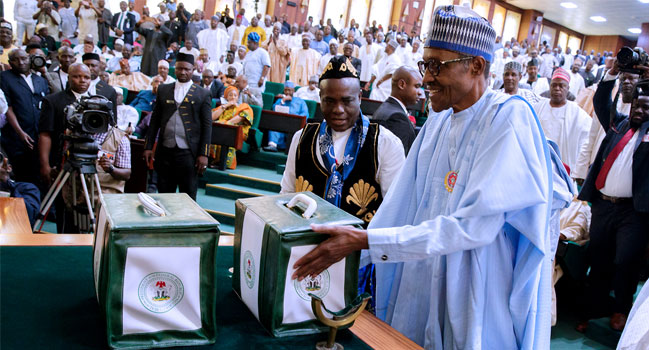by Ajadi Daniel
2018 proposed budget stands at N8.612 trillion
Capital Expenditure in the 2018 proposed budget is 30.8 percent of the entire budget, it stands at N2.652 trillion, the key capital spending in the budget on sectoral basis are:
- Power, Works and Housing has the highest capital proposal with N555.88 billion
- Transportation sector comes second with N263.10 billion
- Special Intervention programmes has the third highest capital allocation with N150 billion
- Defence: N145 billion
- Agriculture and rural development N118.98 billion
- Water resources: N95.11 billion
- Industry, Trade and Investment: N82.92 billion
- Interior: N63.26 billion
- Universal Basic Education: N109.06 billion
- Health:N71.11 billion
- Federal Capital Territory: N40.30 billion
- Zonal Intervention projects (Constituency projects): 100 billion
- North East Intervention Fund : N45 billion
- Niger Delta Ministry: N53.89 billion
- Niger Delta Development Commission: N71.20 billion
Recurrent Expenditure part of the proposed project is N3.494 trillion, key ministries at the top here include:
Interior Ministry : N510.87 billion
Ministry of Education: N435.01 Billion
Ministry of Defence: N422.43 billion
Health: N269.34 billion
Other expenditures
Debt service: N2.014 trillion
Statutory Transfers: N456 billion
Sinking Funds (Bonds) N220 billion
Assumptions and projections of the 2018 budget
Bench mark crude oil price: US$45 per barrel
Oil production estimate: 2.3 million barrels per day
Exchange rate: N305/US$ for 2018
Real GDP growth of 3.5 percent
Inflation rate of 12.4 percent
Revenue Projections:
Oil revenue: N2.442 trillion Naira
Non-oil revenue: N4.165 trillion
Estimated total revenue for 2018 : 6.607 trillion (about 30% more than the 2017 estimate)
